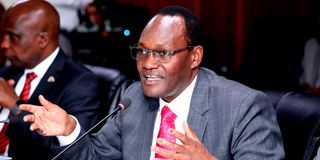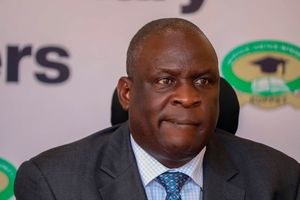
National Treasury Principal Secretary Chris Kiptoo.
School feeding programme in public schools, university student loans and fertiliser subsidy are among popular policies without funding because of a Sh218 billion budget deficit.
National Treasury Principal Secretary Chris Kiptoo revealed that critical government programmes in the Sh4.2 trillion budget for the 2025/26 financial year remain unfunded to the tune of Sh218 billion.
MPs are scrambling to source funds to finance the programmes or risk public wrath.
Loans for higher education students, free education programmes in public schools, fertiliser subsidy and healthcare financing for public insurance holders are without allocations.
Also affected is the Independent Electoral and Boundaries Commission (IEBC), whose financing gap of Sh9.2 billion will affect the preparation for the 2027 General Election in terms of acquiring the relevant technology as well as floating contracts for the supply of strategic election materials.
The IEBC allocation is also critical in the financing of the pending by-elections caused by death, court judgments in election petitions, disciplinary actions and appointment to cabinet of leaders at the Senatorial, member of the National Assembly and Ward levels.

An IEBC official displays a KIEMS kit during a simulation process in the past. File | Nation
Dr Kiptoo while making his presentation to the Budget and Appropriations Committee (BAC) of the National Assembly on the budget for the 2025/26 fiscal period noted that the critical areas are among those that the various government agencies had sought additional financing of Sh944.2 billion.
Although the PS cited budget limitations as reason for the un-funding of the critical areas, he assured that it is not all gloom and doom as the government will review the financing mechanisms should the country’s fiscal situation improve during the implementation of the budget.
“These expenditures were not accommodated in the 2025/26 budget due to constrained fiscal framework but will be reviewed for possible funding in the course of the implementation should the fiscal situation improve,” PS Kiptoo told BAC chaired by Alego Usonga MP Samuel Atandi.
The critical unfunded programmes are spread across 12 State departments and agencies- Basic Education, Higher Education, Medical Services, Public Health and Professional Standards, Agriculture, Interior and National Police Service (NPS).
The others include Correctional Services, Technical, Vocational Education and Training (TVET), the National Treasury, Broadcasting and Telecommunications.
The State Department of Basic Education, which is critical in developing learners and ensuring the government policy of 100 percent transition to Junior School and Secondary school, has not been funded to the tune of Sh39.6 billion.
For instance, free day secondary education (FDSE) has not been allocated Sh21.92 billion and school feeding programmes face the danger of collapse due to Sh2.6 billion that is not available.
There is also Sh4.1 billion that has not been provided for free day junior school financing as well as the school examination and invigilation that lack Sh11 billion.

A boy enjoys his lunch at Olympic Primary School in Kibra, Nairobi. Budget deficit could affect the continuity of the school feeding programme.
Although the House Education Committee has recommended to BAC that Sh5.9 billion in partial financing of the school examination and invigilation be sourced from capitation programmes in secondary school (Sh3 billion), JSS school (Sh2 billion) and primary school (Sh900 million), it remains to be seen whether BAC will actualize the proposal.
The education of students from poor financial backgrounds is also facing a challenge due to the non-allocation of Sh34 billion to finance loans through the Higher Education Loans Board (Helb) and scholarships.
The Sh45.8 billion pending bill for government-sponsored students in private universities has not been allocated in the budget, with the facilities threatening to lock out government-financed students.
Further, Sh11.33 billion has not been budgeted to cover the shortfall for TVET scholarships.
Under the State Department for Medical Services, Kenyans holding public insurance cards face challenges accessing medical services as Sh11 billion required for emergency, chronic and critical illness fund and the Sh10 billion for the primary healthcare fund, have not been allocated in the budget.
Danger of collapse
The non-funding of the two critical health programmes puts President Ruto’s quest for Kenya’s Universal Health Coverage (UHC) in danger of collapse even before takeoff.
Still under health, the required Sh4 billion has not been allocated to finance stipend for the 8,550 UHC workers.
It is also not clear whether they have been allocated Sh4 billion to confirm their employment terms into permanent and pensionable upon expiry of their contracts in May 2026. Embakasi East MP Babu Owino, a member of BAC, said that the UHC staff are critical to the attainment of UHC and failure to consider their demand will affect delivery in the sector.
“Can we consider a budget for the UHC workers to confirm them on a permanent basis? Failure to do so will cause chaos,” said Mr Owino.
The UHC staff have already issued a strike notice, warning that they will down their tools if they are not employed on permanent and pensionable terms.
“The additional budget is critical. For instance, if the UHC workers are not sorted out, they will strike,” Seme MP, Dr James Nyikal, who chairs the House committee on health, told BAC at a recent engagement.
The State Department for Agriculture has not been allocated Sh25.23 billion to finance the enhancement of the country’s food security interventions.
The affected areas include Sh10 billion for the fertiliser subsidy programme to encourage food production, Sh5.53 billion for the much-needed reforms in the sugar companies following the enactment of the Sugar Act 2024, Sh4.5 billion for tea reforms, Sh2 billion for strategic food reserve (SFR) and Sh1.7 billion for seed subsidy programme.
The MSME’s Agricultural finance which is critical in enhancing farmers' access to affordable credit has not been allocated Sh1.5 billion.
“You have not allocated funds for the fertilizer subsidy programme yet you want to move the same fertilizer from zero-rated commodity to tax-exempt. What do you think is the implication to the farmer and the country’s food sufficiency?” posed Kiharu MP Ndindi Nyoro.
The other areas that have been affected include the National Police Service (NPS) that has not been allocated Sh17.6 billion to finance various programmes that include medical cover for police officers Sh9.97 billion, group life and group personal accident cover for the officers Sh6.01 billion and Sh1,6 billion for police modernisation.
The State Department for Interior faces a financing gap of Sh5.8 billion that includes Sh4 billion for NPS modernisation projects and Sh1.8 billion for the construction of National Government Administration offices.
Eldas MP Adan Keynan faulted the National Treasury for failing to allocate Sh24.9 billion to finance Kenya Revenue Authority (KRA) salaries shortfall (Sh8 billion) and equity participation in international financing institutions (Sh16.9 billion).
“You need to go back to the drawing board and find money for KRA staff salary shortfall so that they can collect taxes efficiently,” said Mr Keynan, adding, “it is one of the mechanisms that will protect our taxes.”
The State Department for Broadcasting and Telecommunications faces challenges financing the revitalisation of Postal Corporation of Kenya, which requires Sh3 billion, with State Department for Correctional Services hampered by the non-allocation of Sh1.8 billion to modernise prison security equipment.









